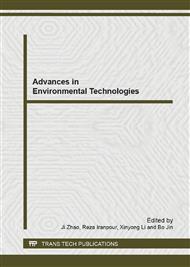p.3934
p.3938
p.3943
p.3947
p.3953
p.3957
p.3961
p.3968
p.3971
Harmony: A Destination that Environmental Protection Rests on - Teachings from Tao Te Ching and The Analects of Confucius
Abstract:
By referring to Tao Te Ching and The Analects of Confucius, this paper argues that humanity is a destination that environmental protection rests on. Fundamentally, harmony and environmental protection have close relationship with each other. Environmental protection is available for the sake of harmony while harmony guarantees the effects of environmental protection. Harmony plays unique roles in environmental protection too. Specifically, harmony acts a monitor to initiate environmental protection, serves as a lever to practice environmental protection, and functions as a mirror to observe environmental protection. Regarding the suggestions of fulfilling harmony in environmental protection, the paper claims that individuals should fill themselves with harmonious consciousness, society should provide peaceful and harmonious atmosphere, and national legislatures should make corresponding laws. In brief, harmony is significant in environmental protection.
Info:
Periodical:
Pages:
3953-3956
Citation:
Online since:
August 2013
Authors:
Price:
Сopyright:
© 2013 Trans Tech Publications Ltd. All Rights Reserved
Share:
Citation:


